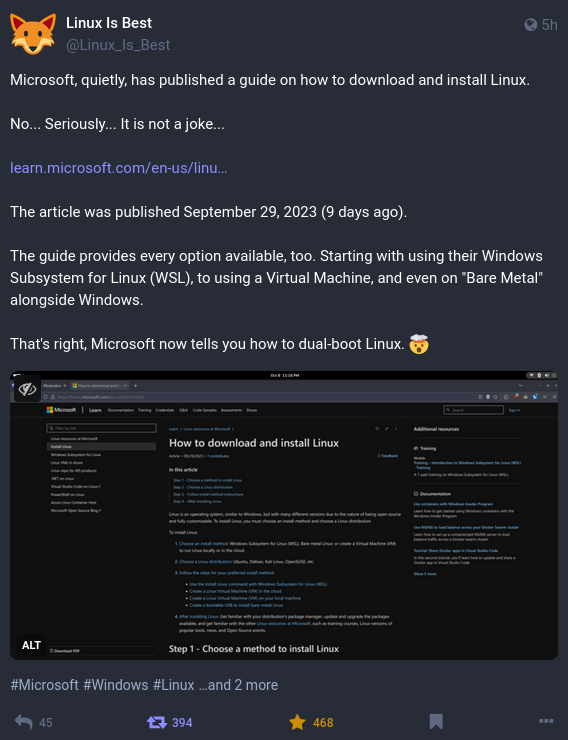this post was submitted on 09 Oct 2023
1807 points (98.2% liked)
Linux
49090 readers
582 users here now
From Wikipedia, the free encyclopedia
Linux is a family of open source Unix-like operating systems based on the Linux kernel, an operating system kernel first released on September 17, 1991 by Linus Torvalds. Linux is typically packaged in a Linux distribution (or distro for short).
Distributions include the Linux kernel and supporting system software and libraries, many of which are provided by the GNU Project. Many Linux distributions use the word "Linux" in their name, but the Free Software Foundation uses the name GNU/Linux to emphasize the importance of GNU software, causing some controversy.
Rules
- Posts must be relevant to operating systems running the Linux kernel. GNU/Linux or otherwise.
- No misinformation
- No NSFW content
- No hate speech, bigotry, etc
Related Communities
Community icon by Alpár-Etele Méder, licensed under CC BY 3.0
founded 5 years ago
MODERATORS
you are viewing a single comment's thread
view the rest of the comments
view the rest of the comments

The way I like to think of it is that non-copyleft licences are like giving everyone freedom by saying there are no laws - suddenly, you can do anything, and the government can't stop you! However, other people can also do anything and the government can't stop them, either, and that includes using a big net to catch other people and make them their slaves. The people caught in the nets aren't going to feel very free anymore, and it's not unreasonable to think that a lot of people will end up caught in nets.
Copyleft licences are like saying there are no laws except you're not allowed to do anything that would restrict someone else's freedom. In theory, that's only going to inconvenience you if you were going to do something bad, and leaves most people much freer.
The idea is basically that you shouldn't be able to restrict anyone else's freedom to modify the software they use, and if you're going to, you don't get to base your software on things made by people who didn't.